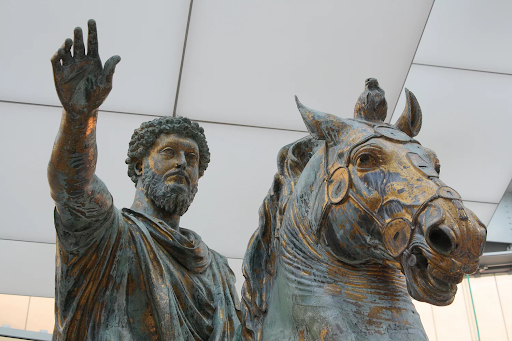We are all faced with challenges and forced to make decisions. One choice that we face daily is where we spend our time. With only 24 hours in a day, we must decide how many hours go towards family, friends, work, hobbies, doom scrolling or exercising (just to name a few options). Like thousands of others, I am heading into my final year of college, and the pressure of the real world looms over me like never before. In these overwhelming times, we must carefully choose where to spend our hours, minutes and seconds.
It goes without saying—or maybe it doesn’t—that one’s time should be spent on what is most important and necessary to live a good life. A good life means experiencing emotions, pursuing interests, forming meaningful connections and finding purpose and fulfillment. Figuring out what is important gives a sense of direction and can help to focus one’s energy into living their version of a good life.
The Stoics—followers of an ancient Greek and Roman school of philosophy called stoicism—would tell us that the only way to live a good life is to live following the four virtues: temperance, wisdom, justice and courage.
These virtues are not to be memorized and recited as a fun party trick. Instead, they are practiced, lived and embodied. When presented with a difficult situation, one should turn to the four virtues for steady guidance. No matter what happens, nothing can take away the virtues.
The virtues deserve a longer explanation (read a more in-depth column I did here) but here’s a general idea: wisdom is knowing what is good, bad and indifferent. Courage is facing fears and challenges with strength. Justice is treating others, and yourself fairly and with respect. Temperance is the practice of self-control and moderation. These virtues help us master ourselves and our interactions with others.
While carrying out a military campaign, Marcus Aurelius, a Stoic philosopher and Roman emperor, reminds himself that:
“If you can find anything in human life better than justice, truthfulness, self-control, courage […] turn to it with all your heart and enjoy the supreme good that you have found […] but if you find all other things to be trivial and valueless in comparison with virtue, give no room to anything else, since, once you turn towards that and divert from your proper path, you will no longer be able without inner conflict to give the highest honor to what is properly good” (Marcus Aurelius, “Meditations,” 3.6).
“Meditations” is the book containing Aurelius’ reflections. In this passage, he is warning himself not to deviate from living by the four virtues, as doing so would forfeit the good life. Moreover, anything that seems to be better is an illusion. Here, a man who has everything at his fingertips (the ruler of an empire and commander of its vast armies) is making time to be mindful of the virtues. Therefore, next time you are about to ‘flip the bird’ at the jerk in the Nissan Altima who cut you off, be more mindful of your ego, my friend. If you think the cashier at the grocery store cannot teach you anything, remember to practice wisdom—everyone has something to teach you.
Let’s return to what a good life looks like and how you practice the virtues. After all, stoicism is a lived philosophy.
Epictetus, another Stoic philosopher, said “Make the best use of what is in your power, and take the rest as it happens.” In other words, stop worrying about things you do not control; you can’t change them, so why give them space and power? Clearly, to the Stoics, what is not important is things out of our control.
Take the virtues or leave them, but I encourage you to reflect intently and figure out what is important to you. Be it family, work, nature, or whatever you come up with, there is no right or wrong choice. The only error is living a life without direction.



